-
REVIEW05-13-2024
Technologies used in the treatment of burn victims in intensive care: a scope review
Revista Brasileira de Enfermagem. 2024;77(1):e20220738
Abstract
REVIEWTechnologies used in the treatment of burn victims in intensive care: a scope review
Revista Brasileira de Enfermagem. 2024;77(1):e20220738
DOI 10.1590/0034-7167-2022-0738
Views0See moreABSTRACT
Objectives:
to analyze the technologies used by the nursing team in the treatment of skin lesions caused by burns in patients under intensive care.
Methods:
this is a scope review conducted on the LILACS, Medline, PubMed, and CINAHL databases without temporal or language restrictions.
Results:
the highlighted technologies included the use of specialized dressings, biological agents such as probiotics and cyanobacteria, as well as negative pressure therapies and enzymes such as papain and collagenase. Some technologies, such as nanocrystalline silver, demonstrated efficacy in infection control.
Final Considerations:
the study identified essential technologies in burn care, emphasizing the need for further research on “soft” technologies. The findings support the promotion of evidence-based nursing care for burn patients in intensive care and enhance knowledge about effective treatments.
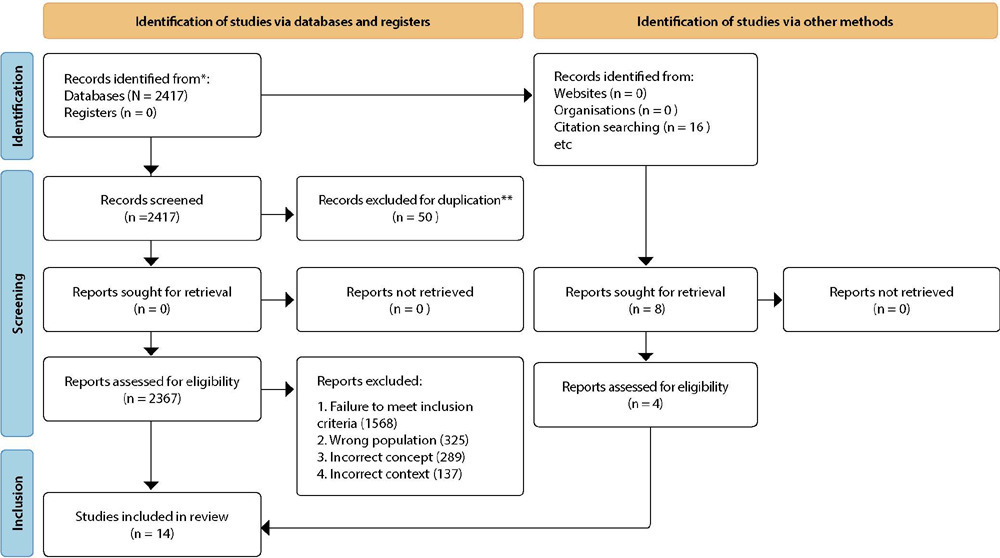
-
ORIGINAL ARTICLE05-03-2024
Cancer patient satisfaction regarding the quality of information received: psychometric validity of EORTC QLQ-INFO25
Revista Brasileira de Enfermagem. 2024;77(1):e20230358
Abstract
ORIGINAL ARTICLECancer patient satisfaction regarding the quality of information received: psychometric validity of EORTC QLQ-INFO25
Revista Brasileira de Enfermagem. 2024;77(1):e20230358
DOI 10.1590/0034-7167-2023-0358
Views0See moreABSTRACT
Objectives:
to psychometrically validate the European Organization for Research and Treatment of Cancer Core Quality of Life Questionnaire EORTC QLQ-INFO25 instrument and identify the domains that influence patients’ perception of the information received.
Methods:
a cross-sectional methodology with cancer patients in a Brazilian philanthropic hospital institution. Sociodemographic and clinical instruments, EORTC QLQ-C30, EORTC QLQ-INFO25 and Supportive Care Needs Survey – Short Form 34 were used. Analysis occurred using Cronbach’s alpha coefficients, intraclass correlation, test-retest and exploratory factor analysis.
Results:
128 respondents participated. Cronbach’s alpha coefficient was 0.85. The test-retest obtained p-value=0.21. In the factor analysis, one item was excluded. Satisfaction with the information received was 74%, with three areas with averages below 70%. In open-ended questions, there was a greater desire for information.
Conclusions:
validity evidence was obtained with instrument reliability, consistency and stability. Respondents expressed satisfaction with the information received.
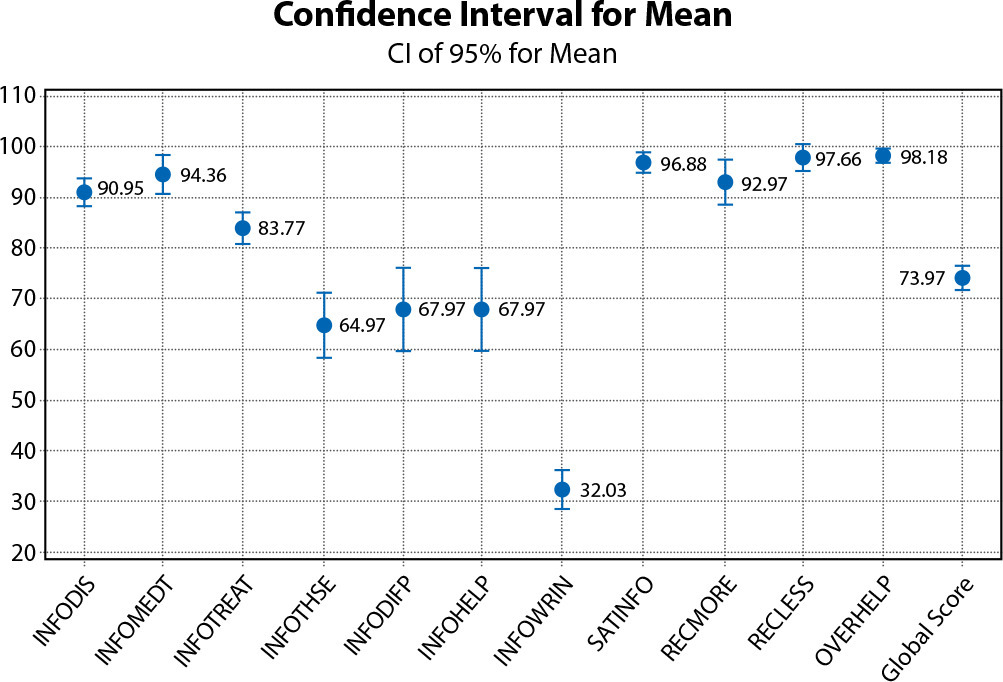
-
05-03-2024
Intervenções de Enfermagem para capacitar o cuidador familiar de uma pessoa com amputação de membro inferior: revisão de escopo
Revista Brasileira de Enfermagem. 2024;77(1):e20230264
Abstract
Intervenções de Enfermagem para capacitar o cuidador familiar de uma pessoa com amputação de membro inferior: revisão de escopo
Revista Brasileira de Enfermagem. 2024;77(1):e20230264
DOI 10.1590/0034-7167-2023-0264
Views0See moreRESUMEN
Objetivos:
mapear intervenciones de enfermería que capaciten al cuidador familiar de la persona con amputación de miembro inferior para su rol.
Métodos:
es una revisión de alcance guiada por la metodología del Instituto Joanna Briggs, llevada a cabo en diferentes bases de datos (incluyendo literatura gris).
Resultados:
se tuvieron en cuenta seis estudios publicados entre 2009 y 2021, a saber: intervenciones de asesoramiento y apoyo para pacientes y familiares; intervenciones de apoyo entre iguales realizadas por un par de profesionales certificados; participación de cuidadores o familiares en grupos de apoyo e intervenciones clave para el equilibrio psicológico del paciente y del cuidador familiar. Dos estudios analizaron la importancia de la formación del cuidador y del amputado y del desarrollo de habilidades de afrontamiento. Otro estudio recomendó intervenciones de apoyo informativo para los cuidadores en relación con el cuidado del amputado y su adaptación a la vida hogareña.
Conclusiones:
los resultados de esta revisión permiten identificar recomendaciones/directrices para la práctica y recomendaciones/sugerencias de intervenciones según las necesidades identificadas de los cuidadores familiares de pacientes con amputación de miembros inferiores.
-
REVIEW05-03-2024
Nursing interventions to empower the family caregiver of person with lower limb amputation: scoping review
Revista Brasileira de Enfermagem. 2024;77(1):e20230264
Abstract
REVIEWNursing interventions to empower the family caregiver of person with lower limb amputation: scoping review
Revista Brasileira de Enfermagem. 2024;77(1):e20230264
DOI 10.1590/0034-7167-2023-0264
Views0See moreABSTRACT
Objectives:
to map nursing interventions that empower the Family caregiver of the person with lower limb amputation for is role.
Methods:
scoping review guided by Joanna Briggs Institute methodology conducted in different databases (including gray literature).
Results:
six studies published between 2009 and 2021 were included. Interventions of counselling and support for patients and family; peer support interventions performed by a certified pair; involvement of caregivers or family members in support groups; and key interventions for patient and family caregiver psychological balance. Two studies discussed the importance of caregiver and amputee training and development of coping skills. Another study recommended Interventions of informative support for caregivers regarding care for the amputee and adaptation to home.
Conclusions:
results of this review allow the identification of recommendations (guidelines) for practice and recommendations/suggestions for interventions according with identified needs of family caregivers of patients with lower limb amputation.
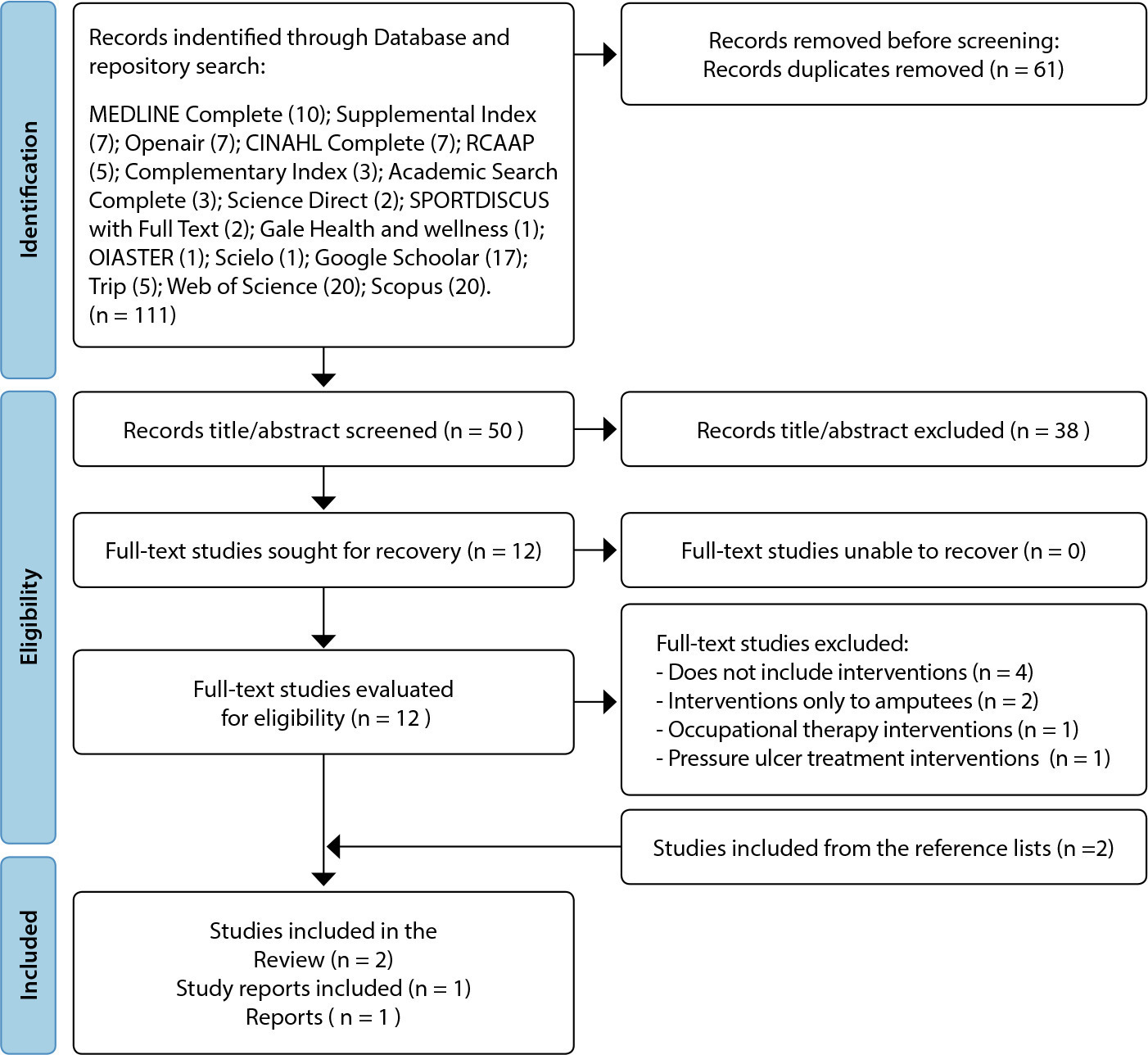
-
ORIGINAL ARTICLE05-03-2024
Pregnancy loss in women with systemic lupus erythematosus: Grounded Theory
Revista Brasileira de Enfermagem. 2024;77(1):e20230225
Abstract
ORIGINAL ARTICLEPregnancy loss in women with systemic lupus erythematosus: Grounded Theory
Revista Brasileira de Enfermagem. 2024;77(1):e20230225
DOI 10.1590/0034-7167-2023-0225
Views0See moreABSTRACT
Objective:
to learn the meanings attributed to pregnancy loss by women with Lupus.
Method:
qualitative research, based on Symbolic Interactionism and Grounded Theory. Data collection took place between January and August 2022 through in-depth interviews. Data analysis went through the stages of initial and focused coding.
Results:
seventeen women participated. The central phenomenon “The climb to motherhood: falls and overcoming” was constructed, consisting of three categories: “Falling to the ground during the climb: the experience of pregnancy loss”; “Getting up and following the path: new attempts to conceive”; and “Remembering the journey: meanings attributed to pregnancy losses”.
Final considerations:
experiencing pregnancy is, analogously, like climbing a mountain, where obstacles need to be overcome to reach the summit. The experience of pregnancy loss is seen as complex, especially when there is fragility in healthcare and a lack of awareness regarding feelings of loss and grief.
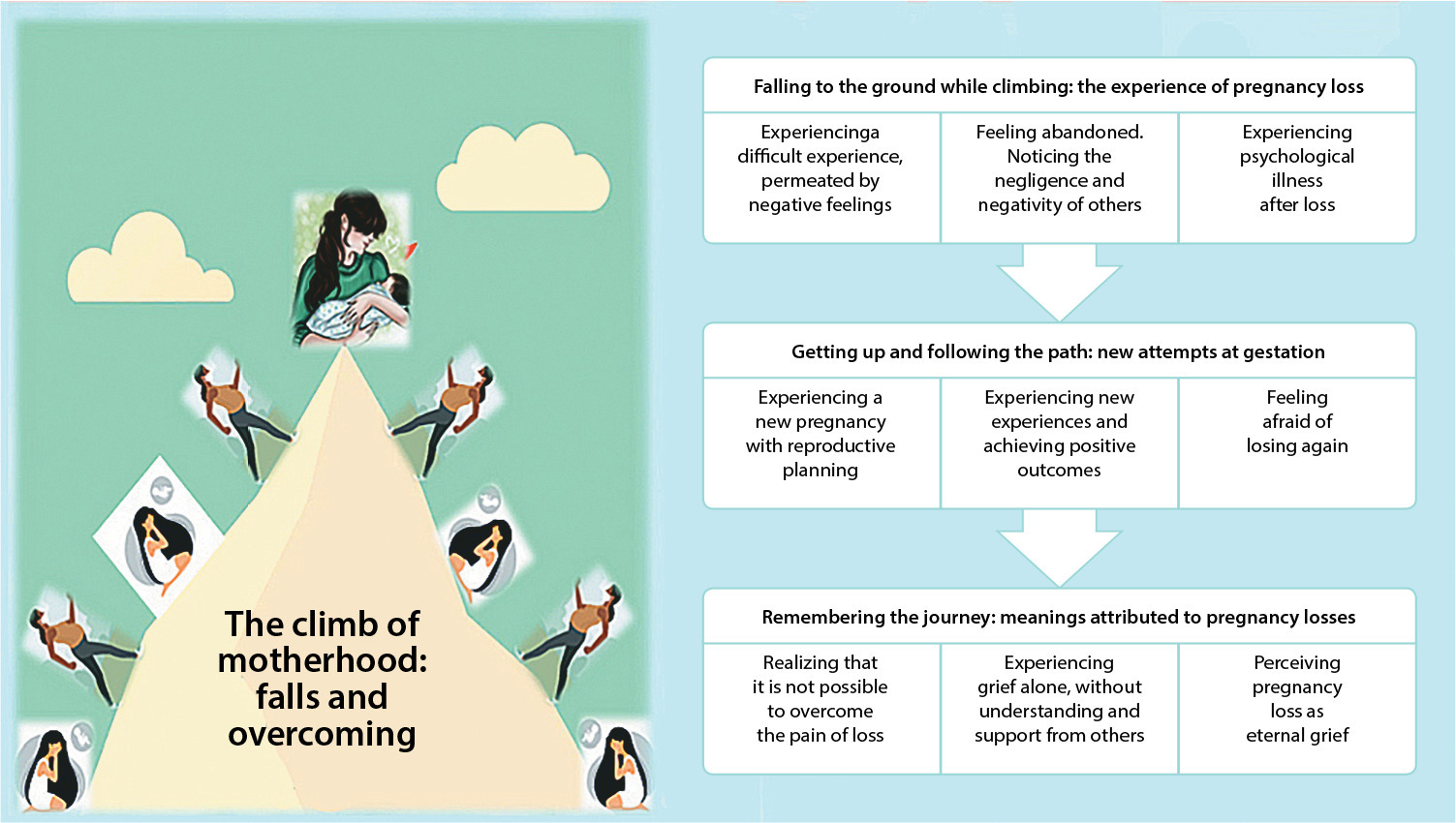
-
ORIGINAL ARTICLE05-03-2024
Josicélia Dumêt Fernandes’ professional trajectory: contributions to psychiatric and mental health nursing
Revista Brasileira de Enfermagem. 2024;77(1):e20230174
Abstract
ORIGINAL ARTICLEJosicélia Dumêt Fernandes’ professional trajectory: contributions to psychiatric and mental health nursing
Revista Brasileira de Enfermagem. 2024;77(1):e20230174
DOI 10.1590/0034-7167-2023-0174
Views0See moreABSTRACT
Objectives:
to analyze nurse Josicélia Dumêt Fernandes’ life story, with emphasis on her work in the psychiatry and mental health fields.
Methods:
historical, qualitative research. Semi-structured interviews and documentary research were used as data collection techniques, collected from September to October 2021. For data analysis, we opted for the content analysis method and comparison with the Foucauldian philosophical framework.
Results:
four categories emerged: Transforming herself and mental health practices; (Re)framing professional practice; Nursing practice and power relations; and The paths and implications in the psychiatry and mental health fields.
Final Considerations:
the study of the biographer demonstrates a search for transformation of herself and mental health practices, with a rupture in paradigms and reframing of her practice in psychiatry and mental health.
-
05-03-2024
Propiedades psicométricas de la versión chilena del cuestionario de calidad de vida para mieloma múltiple
Revista Brasileira de Enfermagem. 2024;77(1):e20230100
Abstract
Propiedades psicométricas de la versión chilena del cuestionario de calidad de vida para mieloma múltiple
Revista Brasileira de Enfermagem. 2024;77(1):e20230100
DOI 10.1590/0034-7167-2023-0100es
Views0See moreRESUMEN
Objetivos:
Evaluar consistencia interna y validez de constructo del QLQ-MY20 para valoración de calidad de vida en sobrevivientes de mieloma múltiple en Chile.
Métodos:
Estudio transversal, realizado entre marzo 2020 y diciembre 2022. Participaron 118 personas de dos hospitales públicos. Se utilizaron los cuestionarios QLQ-C30 y QLQ-MY20. Fueron evaluadas la consistencia interna con alfa de Cronbach (α) y validez de constructo mediante pruebas de hipótesis (Mann Whitney y correlación de Spearman).
Resultados:
El promedio de edad de los participantes era 67,2 (DE=9,2) años. Consistencia interna para escala completa (α=0,779), dimensión “síntomas de la enfermedad” (α=0,671), dimensión “efectos secundarios de los tratamientos” (α=0,538) y dimensión “perspectiva de futuro” (α=0,670). Se comprobaron cuatro de las cinco hipótesis de la validez de constructo: presentaron más síntomas las mujeres, personas con peor performance estatus, con dolor y con peor fatiga.
Conclusiones:
La versión chilena del QLQ-MY20 presenta adecuada consistencia interna y validez de constructo.
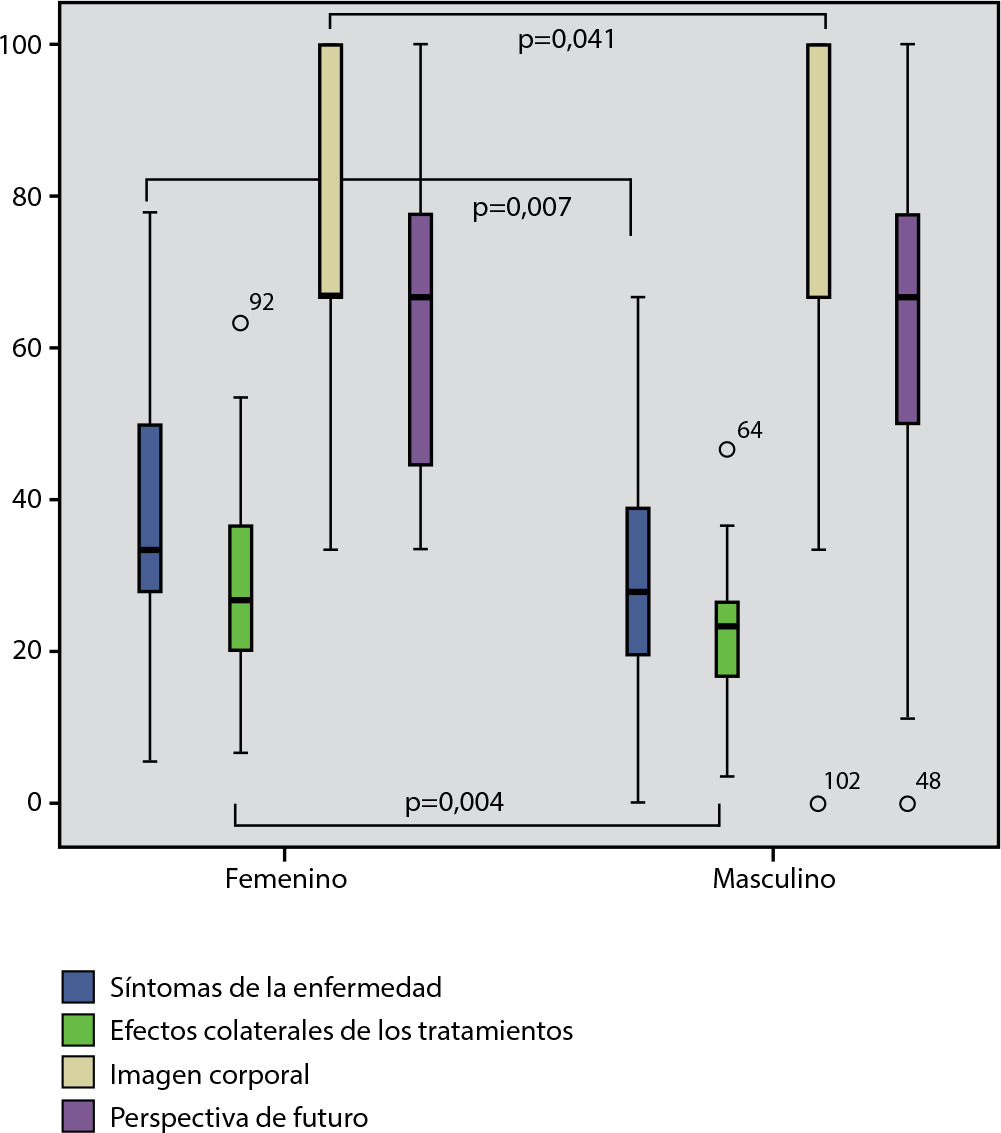
-
ORIGINAL ARTICLE05-03-2024
Psychometric properties of the Chilean version of the quality of life questionnaire for multiple myeloma
Revista Brasileira de Enfermagem. 2024;77(1):e20230100
Abstract
ORIGINAL ARTICLEPsychometric properties of the Chilean version of the quality of life questionnaire for multiple myeloma
Revista Brasileira de Enfermagem. 2024;77(1):e20230100
DOI 10.1590/0034-7167-2023-0100
Views0See moreABSTRACT
Objectives:
To evaluate the internal consistency and construct validity of the QLQ-MY20 for assessing the quality of life in multiple myeloma survivors in Chile.
Methods:
This was a cross-sectional study conducted between March 2020 and December 2022. It involved 118 individuals from two public hospitals. The QLQ-C30 and QLQ-MY20 questionnaires were used. Internal consistency was assessed using Cronbach’s alpha(α), and construct validity was evaluated through hypothesis testing (Mann-Whitney and Spearman correlation).
Results:
The average age of participants was 67.2 years (SD=9.2). Internal consistency for the complete scale was α=0.779, for the “disease symptoms” dimension α=0.671, for the “side effects of treatments” dimension α=0.538, and for the “future perspective” dimension α=0.670. Four of the five construct validity hypotheses were confirmed: women, individuals with worse performance status, those with pain, and those with worse fatigue showed more symptoms.
Conclusions:
The Chilean version of the QLQ-MY20 demonstrates adequate internal consistency and construct validity.
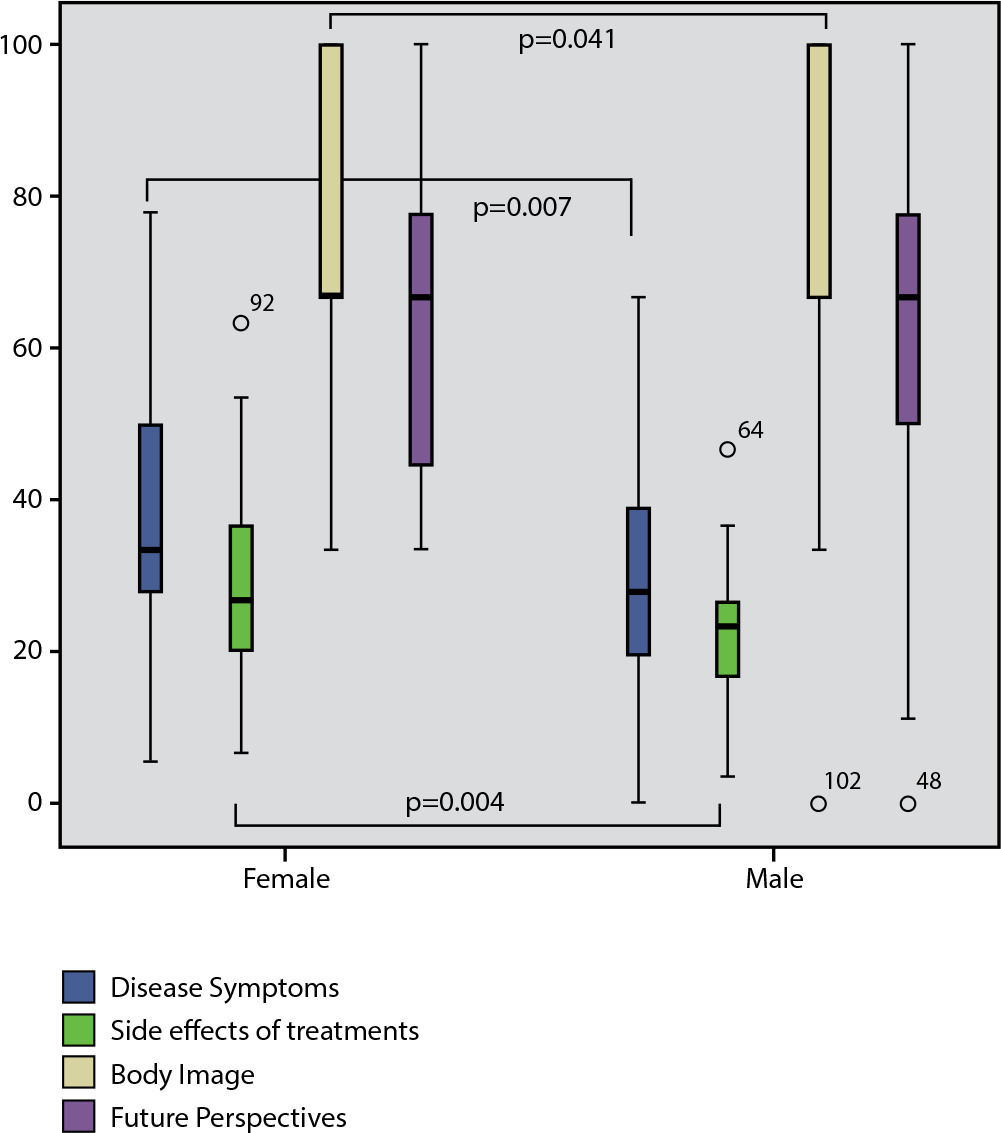
-
01-01-2015
Analysis of the decision-making process of nurse managers: a collective refl ection
Revista Brasileira de Enfermagem. 2015;68(4):668-675
Abstract
Analysis of the decision-making process of nurse managers: a collective refl ection
Revista Brasileira de Enfermagem. 2015;68(4):668-675
DOI 10.1590/0034-7167.2015680414i
Views0See moreABSTRACT
Objective:
to analyze the decision-making model adopted by nurses from the perspective of some decision-making process theories.
Method:
qualitative approach, based on action research. Semi-structured questionnaires and seminars were conducted from April to June 2012 in order to understand the nature of decisions and the decision-making process of nine nurses in position of managers at a public hospital in Southern Brazil. Data were subjected to content analysis.
Results:
data were classified in two categories: the current situation of decision-making, which showed a lack of systematization; the construction and collective decision-making, which emphasizes the need to develop a decision-making model.
Conclusion:
the decision-making model used by nurses is limited because it does not consider two important factors: the limits of human rationality, and the external and internal organizational environments that infl uence and determine right decisions.

-
01-01-2015
Social representations of sexuality for the elderly
Revista Brasileira de Enfermagem. 2015;68(4):662-667
Abstract
Social representations of sexuality for the elderly
Revista Brasileira de Enfermagem. 2015;68(4):662-667
DOI 10.1590/0034-7167.2015680413i
Views0See moreABSTRACT
Objective:
to know the social representations of sexuality for the elderly, based on the Social Representation Theory.
Method:
study performed in a Basic Family Health Unit in Maracanau-CE, Brazil, with 30 elderly adults. Data were collected from March through April of 2013, using the free word evocation technique. Data were organized and processed using the EVOC 2000.software
Results:
the subjects evoked 150 words associated with the evocator word “sexuality”. Out of these, 43 were different. At the possible core of the representation of sexuality for the elderly, the following words were found: love, affection and respect. Sex, companionship, understanding and coexistence composed the intermediate elements of representation.
Conclusion:
the performed analyses pointed to love, respect and affection as central elements that structured and organized the social representation of sexuality in the elder years for the group studied.
-
01-01-2015
Post-accident work behavior in caring for people with HIV/Aids
Revista Brasileira de Enfermagem. 2015;68(4):656-661
Abstract
Post-accident work behavior in caring for people with HIV/Aids
Revista Brasileira de Enfermagem. 2015;68(4):656-661
DOI 10.1590/0034-7167.2015680412i
Views0See moreABSTRACT
Objective:
To identify post-accident conduct in the workplace by health professionals in caring for people with HIV/Aids.
Method:
A qualitative and descriptive research study with a socio-historical perspective (1986-2006), performed in a reference hospital for infectious diseases in the State of Santa Catarina. To collect data, interviews were conducted with oral history among 23 health workers and, for the treatment of data, Bardin’s content analysis was used.
Results:
Post-accident behaviors emerged that included assessment, accident records, chemoprophylaxis when necessary, support, monitoring of the injured worker, and mainly psychological support.
Conclusion:
In situations in which the accident could not be avoided, post-exposure behaviors were important biosecurity strategies mentioned by health workers caring for patients with HIV/Aids, in the sense of minimizing the possible transmission of the HIV virus.
-
01-01-2015
Social support towards the necessity of caring after myocardial infarction
Revista Brasileira de Enfermagem. 2015;68(4):649-655
Abstract
Social support towards the necessity of caring after myocardial infarction
Revista Brasileira de Enfermagem. 2015;68(4):649-655
DOI 10.1590/0034-7167.2015680411i
Views0See moreABSTRACT
Objective:
to know the received or assisted social support by the family towards the necessity of care after acute myocardial infarction.
Method:
qualitative and exploratory research. Data collection was carried out through observation and interviews with six families, from February to May, 2012. Data were also analyzed based on the thematic analysis.
Results:
three categories emerged: Immediate social support; Mediate social support; Late social support.
Conclusion:
social support follows the infarction trajectory, which attains the family members and favors the support according to the needs of care in each lived moments by the patient.
-
01-01-2015
Nursing care management for children hospitalized with chronic conditions
Revista Brasileira de Enfermagem. 2015;68(4):641-648
Abstract
Nursing care management for children hospitalized with chronic conditions
Revista Brasileira de Enfermagem. 2015;68(4):641-648
DOI 10.1590/0034-7167.2015680410i
Views0See moreABSTRACT
Objective:
to understand the interactions of nurses managing nursing care for the hospitalized child with a chronic condition.
Method:
Theoretical and methodological references were used, Complex Thought and grounded theory, respectively. In the study 18 subjects have participated arranged in three groups: nurses, nursing technicians and family members. A semi-structured interview was used as technique for data collection. The data analysis followed three stages of coding: open, axial and selective.
Results:
the category “Needing to manage nursing care to the hospitalized child with chronic condition in Pediatric Inpatient Unit” and their subcategories show the complex inter subjective bindings established by nurses that support the practice of nursing care management.
Conclusion:
There are difficulties for nursing professionals to interact with the child’s family and the dialogical order/disorder/interaction/organization in the implementation of the management process of care is.
-
01-01-2015
Functional disability and socioeconomic and demographic factors in elderly
Revista Brasileira de Enfermagem. 2015;68(4):633-640
Abstract
Functional disability and socioeconomic and demographic factors in elderly
Revista Brasileira de Enfermagem. 2015;68(4):633-640
DOI 10.1590/0034-7167.2015680409i
Views0See moreABSTRACT
Objective:
to verify the prevalence of functional disability and associated socioeconomic and demographic factors in elderly patients of Campina Grande/PB.
Method:
cross-sectional study with elderly patients of both genders. The variables associated with functional disability were assessed using Poisson regression.
Results:
A total of 420 elderly patients were included (68.1% women). The highest prevalence of functional disability were found among females aged 80 or older, white, widowed, of economic classes D/E , who lived alone, with frequency of contacts of up to 224 people and diversity of contacts of up to 14 people. After multivariate analysis, statistically significant association was observed between functional disability, gender and age group.
Conclusion:
the association between functional disability gender and age group is shown to be an important guidance for health interventions since it will allow health services to plan actions aiming to improve, maintain or restore the functional capacity of the elderly population.
-
01-01-2015
Hypertension and Diabetes Mellitus Program evaluation on user’s view
Revista Brasileira de Enfermagem. 2015;68(4):626-632
Abstract
Hypertension and Diabetes Mellitus Program evaluation on user’s view
Revista Brasileira de Enfermagem. 2015;68(4):626-632
DOI 10.1590/0034-7167.2015680408i
Views0See moreABSTRACT
Objectives:
to evaluate the program proposed by the Reorganization Care Plan for Hypertension and Diabetes Mellitus on user’s view, and describe aspects of the trajectory of the participants correlating with the program’s evaluation.
Method:
evaluative study with a qualitative approach conducted in health units with the Family Health Strategy, in a city of the metropolitan region of Curitiba, in the period from September to March, 2012. A total of 30 adults with hypertension and/or Diabetes mellitus were interviewed. Data were analyzed through content analysis.
Results:
Four categories were identified: Disease diagnosis; Reasons for the program need; Knowledge of the program, and program evaluation.
Conclusion:
there was the recognition of the orientations, and the monitoring of activities developed, with emphasis in cost reduction for users.
-
01-01-2015
Violence in the eye of adolescents: education intervention with Culture Circles
Revista Brasileira de Enfermagem. 2015;68(4):617-625
Abstract
Violence in the eye of adolescents: education intervention with Culture Circles
Revista Brasileira de Enfermagem. 2015;68(4):617-625
DOI 10.1590/0034-7167.2015680407i
Views0See moreABSTRACT
Objective:
to apply the methodology of Culture Circles on adolescents as a strategy for health education of nurses in the construction of the collective knowledge of the thematic violence.
Method:
action research type and qualitative study. Participants were 11 adolescents from a public school in Recife, PE, Brazil. Data production in Culture Circles included the participant observation with field diary, photographic recording and filming, as well as the photovoice technique. The analysis was performed by triangulating data in dialogue with the literature.
Results:
it was shown that the problematizing action provided by the Culture Circle made possible to create situations in which adolescents felt invited to critically refl ect on the phenomenon of violence in all its complexity.
Conclusion:
the health education intervention, performed by Culture Circles, added learning and mutual growth subsidizing nursing care actions that excel at leadership and autonomy of adolescents.

-
01-01-2016
Discoveries of Biological Sciences and their implications for nursing practice
Revista Brasileira de Enfermagem. 2016;69(4):619-620
Abstract
Discoveries of Biological Sciences and their implications for nursing practice
Revista Brasileira de Enfermagem. 2016;69(4):619-620
DOI 10.1590/0034-7167.2016690401i
Views1For the longest time, the production of knowledge in the field of biological sciences was viewed as the exclusive responsibility and competence of medical professionals. This scenario has changed in light of the worldwide trend of improvements in other health professions, which includes the need to implement the use of evidence-based methodology in nursing practice. […]See more -
01-01-2016
Descobertas das Ciências Biológicas e as implicações para a prática da Enfermagem
Revista Brasileira de Enfermagem. 2016;69(4):619-620
Abstract
Descobertas das Ciências Biológicas e as implicações para a prática da Enfermagem
Revista Brasileira de Enfermagem. 2016;69(4):619-620
DOI 10.1590/0034-7167.2016690401i
Views1A produção de conhecimento na área das ciências biológicas, durante muito tempo, foi vista como de responsabilidade e competência exclusivamente de profissionais médicos. Esse cenário alterou-se frente à tendência mundial de aperfeiçoamento dos demais profissionais de saúde, incluindo-se a necessidade de se concretizar a utilização da metodologia da prática baseada em evidência na atuação do […]See more -
01-01-2016
The importance of civilian nursing organizations: integrative literature review
Revista Brasileira de Enfermagem. 2016;69(3):610-618
Abstract
The importance of civilian nursing organizations: integrative literature review
Revista Brasileira de Enfermagem. 2016;69(3):610-618
DOI 10.1590/0034-7167.2016690326i
Views0See moreABSTRACT
Objective:
to identify and analyze evidence from studies about the importance of civilian nursing organizations.
Method:
an integrative literature review, for which searches were conducted in the databases LILACS, PubMed/MEDLINE, SciELO, BDENF, and Scopus.
Results:
sixteen articles published between the years 2004-2013 were selected, 68.75% of which were sourced from Brazilian journals and 31.25% from American journals.
Conclusion:
civilian nursing organizations are important and necessary, because they have collaborated decisively in nursing struggles in favor of the working class and society in general, and these contributions influence different axes of professional performance.
-
01-01-2016
Effects from acupuncture in treating anxiety: integrative review
Revista Brasileira de Enfermagem. 2016;69(3):602-609
Abstract
Effects from acupuncture in treating anxiety: integrative review
Revista Brasileira de Enfermagem. 2016;69(3):602-609
DOI 10.1590/0034-7167.2016690325i
Views0See moreABSTRACT
Objective:
to evaluate the scientific evidence that is available in the literature on the effects of acupuncture for treating anxiety and on the quality of such studies.
Method:
the study is an integrative review of CINAHL, LILACS, PUBMED-PICO, SciELO, and The Cochrane Library between 2001 and 2014. Keywords anxiety, acupuncture therapy, acupuncture, and anxiety disorders were combined among themselves to ensure a wide search of primary studies.
Results:
among 514 articles, 67 were selected to be fully read and 19 were included. Among these, 11 were found to have strong evidence levels. Among the six articles about randomized clinical studies, five were found to be of reasonable quality. Two studies used acupuncturist nurses to perform their interventions. Its results showed positive and statistically significant effects from using acupuncture for treating subjects with anxiety.
Conclusion:
acupuncture seems to be a promising treatment for anxiety; however, there is a need for improving the methodological quality of the research on this field.
-
01-01-2016
Palliative care and spirituality: an integrative literature review
Revista Brasileira de Enfermagem. 2016;69(3):591-601
Abstract
Palliative care and spirituality: an integrative literature review
Revista Brasileira de Enfermagem. 2016;69(3):591-601
DOI 10.1590/0034-7167.2016690324i
Views0See moreABSTRACT
Objective:
to analyze scientifi c articles published in international online journals about palliative care and spirituality.
Methods:
an integrative literature review with data collected in September 2014 from the LILACS, SCIELO, MEDLINE/PubMed, and IBECS databases.
Results:
thirty-nine publications were identifi ed and their textual analysis facilitated through four thematic approaches: the meaning of spirituality in the context of palliative care; palliative care and spiritual support; spirituality and relief of pain and other symptoms in patients under palliative care; and instruments to evaluate the spiritual dimension of the scope of palliative care.
Conclusion:
this study examined the relevance of the spiritual dimension in the care of patients with palliative care and the need for developing new studies to disseminate knowledge about this topic.
Descriptors:
Palliative Care; Palliative Care at End of Live; Spirituality; Religion; Health.
-
01-01-2016
Educational technologies to encourage (self) care in postpartum women
Revista Brasileira de Enfermagem. 2016;69(3):582-590
Abstract
Educational technologies to encourage (self) care in postpartum women
Revista Brasileira de Enfermagem. 2016;69(3):582-590
DOI 10.1590/0034-7167.2016690323i
Views0See moreABSTRACT
Objective:
to evaluate national and international literature regarding the use of educational technologies to encourage self care in postpartum women.
Method:
an integrative review of the literature. The articles were collected from the CINAHL, SCOPUS, PubMed, SciELO, LILACS and Cochrane databases; the time period for the articles referred to January/2004 to July/2014; the languages used in the articles were Portuguese, English, Spanish and French; the articles were selected from the following descriptors: postpartum care period, educational technology, nursing and self care. Twenty-seven articles were selected for analysis
Results:
based on the information found, the scales, counseling and home visits were among the most recommended educational technologies.
Conclusion:
the technologies promote communication, but are sometimes dependent on computer and internet access, which hinder their use by low-income women.

-
01-01-2016
Patients with HIV/Aids and ulcer risk: nursing care demands
Revista Brasileira de Enfermagem. 2016;69(3):574-581
Abstract
Patients with HIV/Aids and ulcer risk: nursing care demands
Revista Brasileira de Enfermagem. 2016;69(3):574-581
DOI 10.1590/0034-7167.2016690322i
Views0See moreABSTRACT
Objective:
to analyze the demand for nursing care and the risk of pressure ulcers (PU) of patients with HIV/Aids.
Method:
quantitative survey, carried out from December 2012 to March 2013 in a public hospital of Teresina, state of Piauí, Brazil.
Results:
the sample of 31 patients was predominantly male, mean age 36.6 years, average care demand 49.4%, most showing some risk of developing PU. The variables correlated with PU risk were care demand and clinical outcome (death). Those associated with care demand were age and clinical outcome (death).
Conclusion:
the results showed that patients require moderate nursing care needs and most of them present risk of developing PU.

-
01-01-2016
Lack of anticipated support for care for community-dwelling older adults
Revista Brasileira de Enfermagem. 2016;69(3):566-573
Abstract
Lack of anticipated support for care for community-dwelling older adults
Revista Brasileira de Enfermagem. 2016;69(3):566-573
DOI 10.1590/0034-7167.2016690321
Views0See moreABSTRACT
Objective:
to identify the factors associated with lack of anticipated support for care for community-dwelling older adults.
Method:
this study presents comparison and logistic regression analyses of data from 671 individuals who took part of the multicentric study entitled “Frailty in older Brazilians” – a quantitative, epidemiologic and transversal investigation carried out between 2008 and 2009.
Results:
the subjective evaluation of anticipated support for care for community-dwelling older adults was a good indicator of risk for lack of anticipated support for care in women, older adults who live alone and those with poor self-rated health.
Conclusion:
it is necessary to reflect upon the formal support system currently available for older people in Brazil, considering that those who most frequently presented lack of anticipated support for care are an increasing population. The study also highlights the importance of using subjective methods for the evaluation of the adequacy of older adults’ support network.
Search
Search in:
Nuvem de Tags
Adolescente (85) Atenção Primária à Saúde (239) COVID-19 (91) Criança (91) Cuidados de Enfermagem (269) Educação em Enfermagem (151) Educação em Saúde (139) Enfermagem (930) Enfermagem Pediátrica (86) Estudantes de Enfermagem (77) Estudos de Validação (131) Família (87) Idoso (208) Promoção da Saúde (99) Qualidade de Vida (104) Saúde do Trabalhador (86) Saúde Mental (145) Saúde Pública (82) Segurança do Paciente (150) Tecnologia Educacional (100)



